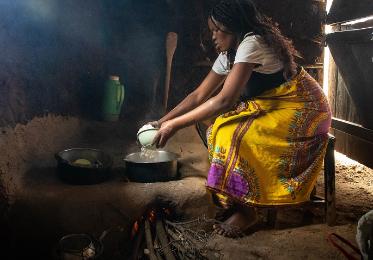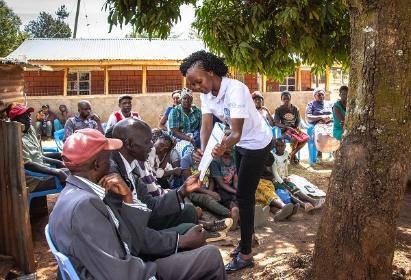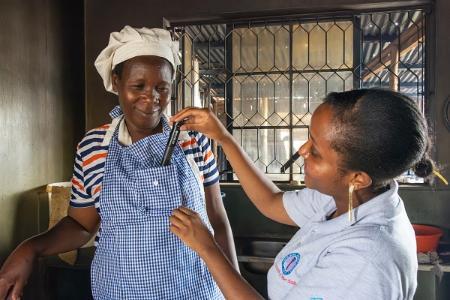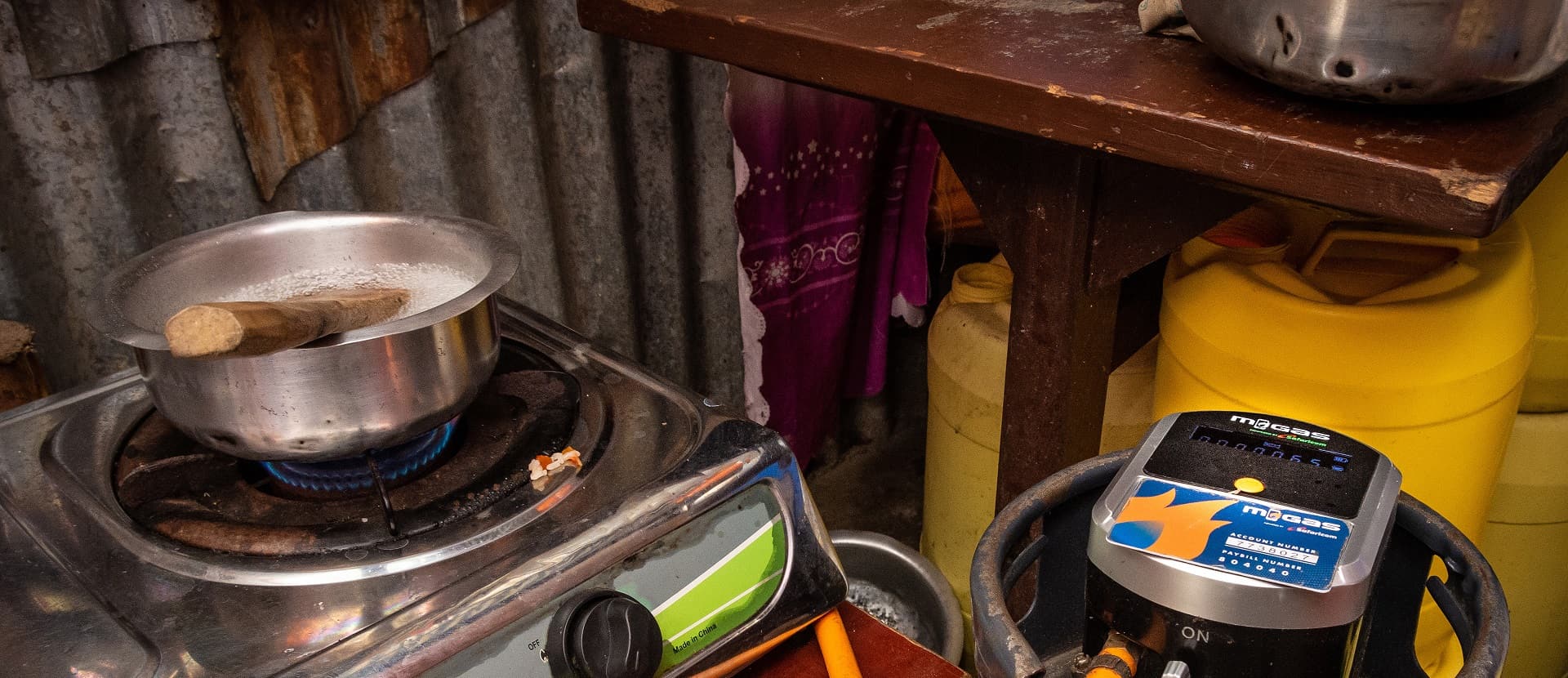Tackling the "silent killer” in the kitchen: household air pollution
Household air pollution impacts three billion people who rely on solid fuels such as wood, charcoal or animal dung burned in inefficient stoves for heating and cooking. Preventive action could have massive, population-wide health benefits, particularly for women and children who share the majority of domestic burdens, and help to meet number 7 of the UN’s sustainable development goals: access to affordable, reliable, sustainable clean and modern energy for all.
Around 1 billion people in Africa rely on polluting fuels such as wood, charcoal and kerosene for cooking, lighting and heating homes. Household air pollution from burning these fuels causes around 700,000 premature deaths each year. This represents some 10% of total mortality in Africa.
 Women and children are particularly vulnerable due to traditional domestic roles around cooking. Using these fuels also contributes to forest degradation and climate change.
Women and children are particularly vulnerable due to traditional domestic roles around cooking. Using these fuels also contributes to forest degradation and climate change.
NIHR Global Health Research Unit - CLEAN-Air Africa is a partnership between UK researchers and health authorities and institutions in Kenya, Tanzania, Rwanda, Uganda and Cameroon. It is co-led by the University of Liverpool and Kenya Medical Research Institute (KEMRI).
Building on the success of the previous NIHR Global Health Research Group award from 2018-21, the Unit has adopted 3 key strategies; in-depth research, strengthening health systems and community and stakeholder engagement. It thereby addresses several of the global Sustainable Development Goals (SDGs)
The Unit has set up an Air Pollution Centre of Excellence at KEMRI to support research activities across Africa. The Centre includes a state-of-the-art air quality assessment laboratory. It is affiliated with Kenya’s Ministry of Health, which showcased it at COP28 in December 2023.
Dr James Mwitari, KEMRI, Co-Director of CLEAN-Air Africa commented;
Through the Centre, CLEAN-Air Africa is now steering efforts to scale adoption of clean energy in Kenya including chairing the Ministry of Health’s Technical Working Group on Energy, Air Pollution and Health. This ensures that health is at the heart of policy decision making in the country.
By monitoring air pollution in homes and school kitchens, CLEAN-Air Africa has shown that switching from polluting fuels to clean cooking with liquid petroleum gas (LPG) improves women’s and children's health.
Dr Elisa Puzzolo, Co-Director of CLEAN-Air Africa said;
We have demonstrated that rapid transition to clean cooking with LPG in sub-Saharan Africa meets the immediate public health priority with climate, gender and environmental co-benefits. Our research has shown the benefits of both financial and technological innovation in assisting a rapid, equitable transition to clean cooking fuels.
Putting household air-pollution on the global agenda
“Our work is building on 15 years of research,” says Professor Daniel Pope who currently leads the Institute of Population Health research theme, Energy, Air Pollution and Health, at the University of Liverpool. “Our group co-led the first ever randomised control trial of an improved cooking stove in Guatemala, which proved hugely influential and helped put the household air pollution issue on the global agenda.” Indeed, household smoke is estimated to kill almost 4 million people every year – more than TB, AIDs and malaria combined.
To tackle the problem, the focus has been on burning biomass more cleanly using improved cookstoves. However, the work of Pope and others has identified that in lower and middle-income countries (LMICs) such stoves fail to achieve reductions in smoke anywhere near WHO safe guideline levels. As a result, in 2014 WHO guidelines for indoor air quality, led in development by the group through Liverpool’s Professor Nigel Bruce, had the explicit recommendation for LMICs to rapidly adopt clean household energy like gas and electricity. Based on this work the group produced a REF2014 case study rated in the top 20 out of 7000 for UK research having a global impact by UK-CDS.
Healthy Kitchens: Clearing the air for African schools
Watch our documentary about reducing air pollution in school kitchens in Africa
Training community health workers
Focusing on policy and community engagement, CLEAN-Air Africa has gained significant support from the Kenyan government. In 2021, it ratified a national community health worker (CHW) training scheme. CLEAN-Air Africa has now trained 2,500 instructors across Kenya. These instructors will go on to train 120,000 CHWs, with the aim of reaching Kenya’s entire population.
 CLEAN-Air Africa is tracking impact through a new digital health surveillance system. Early evaluation of the initiative has demonstrated significant positive benefits for households.
CLEAN-Air Africa is tracking impact through a new digital health surveillance system. Early evaluation of the initiative has demonstrated significant positive benefits for households.
In 2023, CLEAN-Air Africa partnered with the Office of the First Lady and Kenya’s 'Mama Doing Good Foundation'. Together, they developed a special training program for women’s table banks, a nationwide credit initiative.
They are now training table bank providers on household air pollution prevention through clean energy. It also enables women to buy equipment for clean cooking, heating and lighting.
Dan Pope, co-Director of CLEAN-Air Africa said;
Working with both CHWs and local table banks, households will be empowered with knowledge about household air pollution and health and how to address this through clean energy options. We are excited to contribute to Kenya’s push for universal access to clean cooking by 2028, and to reducing the 23,000 deaths each year in Kenya caused by use of polluting fuels.
Mama Doing Good and Kenya’s Ministry of Health plan to roll out the table bank training to reach over 300,000 women in 2024. CLEAN-Air Africa will support the initiative and evaluate its impacts across Kenya. CLEAN-Air Africa has begun to deliver similar training programmes in Rwanda, Uganda and Cameroon.
Clean cooking in schools
Across sub-Saharan Africa more than 90% of schools rely on wood fuel and charcoal for cooking for students and staff. In Kenya alone this translates to more than 1.3 million metric tonnes of wood being consumed each year by its schools and colleges. This has huge environmental impacts on forest reserves in the region.
 The high levels of air pollution damage the health and wellbeing of school cooks, learners and staff. CLEAN-Air Africa tested air quality in school kitchens, classrooms and playgrounds. They found dangerous levels of particulate matter that causes respiratory disease.
The high levels of air pollution damage the health and wellbeing of school cooks, learners and staff. CLEAN-Air Africa tested air quality in school kitchens, classrooms and playgrounds. They found dangerous levels of particulate matter that causes respiratory disease.
In East Africa governments are helping public institutions move to LPG and electricity. CLEAN-Air Africa now works with the major Development Bank Foundations supporting these transitions.
The Unit will evaluate a scaled transition to clean cooking in schools across East Africa. They will document the air quality, health and educational impacts from switching to clean cooking. This evidence will inform future strategies for health equity in Rwanda and Kenya.
Working with schools in Kenya, the Unit has created a documentary film, launched in December 2023. This highlights the importance of clean cooking in schools. It is also running training workshops for journalists.
Looking ahead - beyond COP28
Dr Elisa Puzzolo, represented Liverpool at the 2023 Conference of the Parties (COP28) to discuss climate issues. She presented the findings of the team’s latest paper to be published in The Lancet Respiratory Medicine.
The study ‘Estimated health effects from domestic use of gaseous fuels for cooking and heating in high, middle and low-income countries: A systematic review and meta-analyses’, was commissioned by the World Health Organization (WHO).
It is the first systematic and comprehensive assessment of all health effects from use of natural gas, LPG and biogas, compared to polluting fuels and electricity, for household cooking and heating on a global scale. It further demonstrates the substantial health gains from switching from polluting solid fuels and kerosene to LPG in LMICs.
Dr Puzzolo said;
Exposure to household air pollution from polluting domestic fuel represents a substantial global public health burden. This paper provides important contemporary evidence to inform national clean energy policies. Looking ahead, the prospects for production of fully renewable BioLPG from municipal waste in African cities are promising further gains in sustainability.
Professor Dan Pope was also featured on the Original Ideas podcast talking about CLEAN-Air Africa;
Listen now
You can also listen on Spotify or Apple Podcasts:

Opinion Piece: LPG is a fossil fuel. Experts explain why it’s still Africa’s best option for cleaner, greener cooking (for now)
Professors Dan Pope and Nigel Bruce published an article in the conversation outlining why liquid petroleum gas (LPG) is still the best option for African nations and how we can tackle access barriers to help the transition.